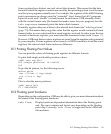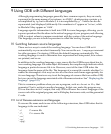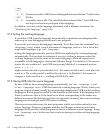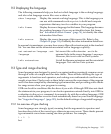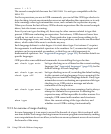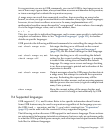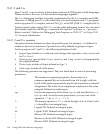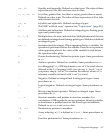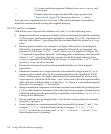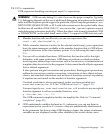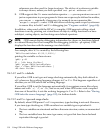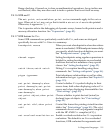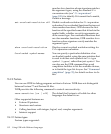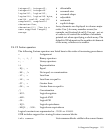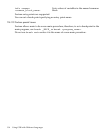==, !=
Equality and inequality. Defined on scalar types. The value of these
expressions is 0 for false and non-zero for true.
<, >, <=, >=
Less than, greater than, less than or equal, greater than or equal.
Defined on scalar types. The value of these expressions is 0 for false
and non-zero for true.
<<, >>
left shift, and right shift. Defined on integral types.
@
The GDB “artificial array” operator (see “Expressions” (page 83)).
+, -
Addition and subtraction. Defined on integral types, floating-point
types and pointer types.
*, /, %
Multiplication, division, and modulus. Multiplication and division
are defined on integral and floating-point types. Modulus is defined
on integral types.
++, --
Increment and decrement. When appearing before a variable, the
operation is performed before the variable is used in an expression;
when appearing after it, the value of the variable is used before
the operation takes place.
*
Pointer dereferencing. Defined on pointer types. Same precedence
as ++.
& Address operator. Defined on variables. Same precedence as ++.
For debugging C++, GDB implements a use of '&' beyond what is
allowed in the C++ language itself: you can use '&(&ref)' (or, if
you prefer, simply '&&ref') to examine the address where a C++
reference variable (declared with '&ref') is stored.
-
Negative. Defined on integral and floating-point types. Same
precedence as ++.
!
Logical negation. Defined on integral types. Same precedence as
++.
~ Bitwise complement operator. Defined on integral types. Same
precedence as ++.
., ->
Structure member, and pointer-to-structure member. For
convenience, GDB regards the two as equivalent, choosing whether
to dereference a pointer based on the stored type information.
Defined on struct and union data.
.*, ->*
Dereferences pointers to members.
[] Array indexing. a[i] is defined as *(a+i). Same precedence as
->.
() Function parameter list. Same precedence as ->.
9.4 Supported languages 107



